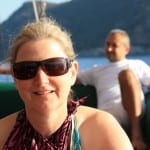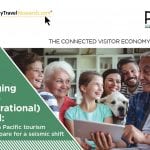Australia’s Tourism Industry Could Learn From Turkey
The response to Bronwyn’s recent piece on the joys of domestic travel has made me realise how useful it is to have a point of comparison. It gives us some perspective.
Last year I spent 5 weeks in Turkey on an (ahem) detailed research trip to make that comparison. It’s a useful comparison because, according to the very useful Economist World in Figures app, Turkey actually sits quite close to Australia in the world tourism rankings on inbound benefits. It’s derived from more visitors spending less but nevertheless, we’re pretty close. Like Australia, Turkey is also a fairly large country with some world-class natural attractions.
We both also have economies that have benefited from the resource boom.
In other ways, the comparison is less fair. Turkey sits only about 3 hours from some of the world’s highest per capita spending outbound tourism markets and its built environment contains significantly more cultural and heritage activities. This is not to decry the amazing cultural history of the First Australians, simply to say that often it is quite remote and it doesn’t involve a lot of buildings.
In the other direction, Turkey is further away than Australia from some of the world’s fastest-growing tourism markets. Whilst fast growing, there is still a great deal more poverty in Turkey than there is in Australia.
The first thing that struck me is the difference in how Turkey is utilising its wealth from resources to benefit tourism. Everywhere we went new infrastructure projects were underway. Almost every town we visited had a brand spanking new bus station, well integrated into local public transport networks and with cafes and shops. Museums, art galleries, and historic houses were often being renovated with new interpretive material. New rail links are being built and trains are being upgraded. Turkey has been successfully attracting funding from major international bodies, as well as from private finance. Turkey is determined that the resources boom will leave it with an improved situation for both its citizens and visitors. Last week, it announced it will build the world’s biggest airport in Istanbul to take advantage of its geographic location. And guess what, it isn’t 300km from the city it’s meant to serve?
As a Sydney-sider, I wanted to weep when I saw their well-integrated public transport system. An Istanbulkart is widely available from newsagents and enables access to trams, ferries, buses, and trains with one card. The system is easy to use and the trams were full of tourists availing themselves of these amazing opportunities. (Obviously, Melburnians can feel a bit smugger, although a recent visit there made it clear how hard it is to get a ticket for a visitor.)
The network of buses connecting cities is frequent and moderately priced, with new buses with refreshments and wifi. Our first ‘bus hostie’ was a genial giant leading me to a nickname for them all as ‘Hagrid’. The fact that I did this is a measure of engagement and affection.
But Turkey is also better at many of the things that give visitors things a memorable experience as well as an easy one.
Our preference is to stay in small family-run hotels. In Australia, this would probably mean the uniform bedspread, cane furniture, and pictures on the wall at around $150-200 a night. In Turkey, even the most modest hotel would seek to personalise the experience with cushions, rugs, or pictures reflecting local culture or history.
Free tea and coffee were common offerings with attractive common areas. Drinks like beer were in a communal fridge and were charged at very competitive rates (typically the same or very little more than supermarket rates), encouraging one to drink there rather than bring it in.
Dining and common areas were situated on roofs, balconies, or around the pool with attractive gardens or fruit trees.
The Turks have also grasped the importance of the digital revolution and how it can help guests, but also help them. Every hotel (even the one that cost us 20 Euros a night) offered us free wifi. Even those fantastically cost-effective buses had free wifi. And everyone proudly displayed their TripAdvisor ratings and encouraged us to post reviews (whatever our opinions). In contrast, I find many in Australia either want to ignore TripAdvisor or regard it as an enemy.
It remains an irony for me that I had better internet coverage staying in a cave hotel in Turkey than I can get even in Australia’s capital cities!
A larger proportion of accommodations and attractions could be booked over the internet than in Australia. Even in conservative Konya, we were able to book our hotel over the Internet in real-time. The only place we found this to be an issue was in Goreme – and it significantly changed our accommodation choices.
If you want to see what is possible, I would check out the websites of the Dov Metsim in Pamukkale or the Homeros in Seljuk.
Visiting Turkey also made me realise that we can’t be complacent about advantages like the quality and freshness of our produce. We met many Australians on our travels and everyone raved about Turkish food based on tasty, beautiful, and seasonal produce at exceptionally good prices. In Australia’s capital cities and in a few key foodie destinations you might see that, but even the more off-the-beaten-track locations in Turkey could provide it. We can still be proud of our products, but we need to be able to experience it more consistently across Australia.
Although the Turks have a long history and tradition of hospitality, it’s also because they recognise the importance of tourism to their economy. They’ve successfully combined the two. In Australia, it often feels like we tolerate tourists for their money, but don’t really like them. In Turkey, you felt that people were proud to show you their country and genuinely welcomed visitors. That of course was a convincing reason to return – as I heard from many Australians who had become advocates for Turkey.
The most interesting thing about this is that the Turkish government gives a lot less direct support to tourism businesses than we enjoy here in Australia. Often businesses in Turkey have had to figure out what to do and how to market for themselves. So one of our points of comparison should realise how lucky we are that we have the network of support and education we have. And perhaps to pause before we feel we need more help.
I’m not saying that the Turkish experience is perfect. I’ll talk in a further blog piece about what we could share that might be useful for them, but I do think there are a few things we could learn. Most notably:
– Love our customers, think creatively about what they want (and give it to them)
– Recognise that giving them the means to find us and tell other people about us online can only help our businesses
– Recognise the strengths of our offer, but don’t be complacent about it
– Be grateful for what we have and look beyond it, not to it
But if we do want more help, perhaps the best way is to keep the pressure on to get the infrastructure that ensures tourism (which has suffered from the resources boom … link to TRA articles) gets a lasting legacy for our businesses
Do you want to hear more from us?
Want to be kept up to date with the latest travel and tourism insights? Join Our Mailing List. Every 2 weeks, we send the latest practical insight for you to apply to your business and destination marketing.





Leave a Reply